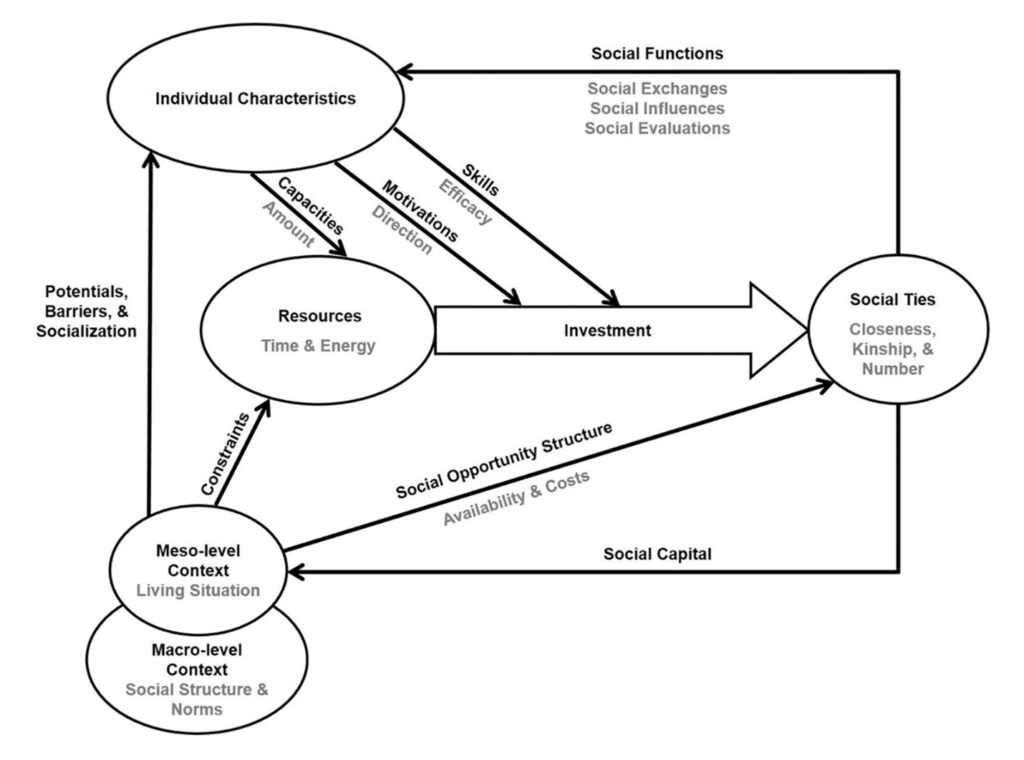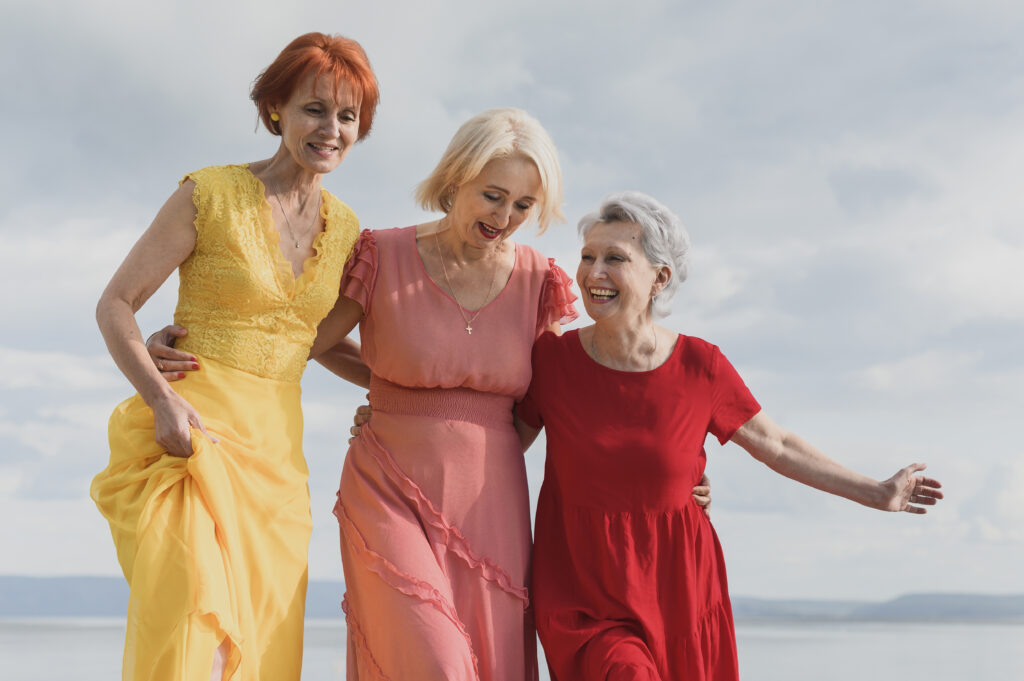Forming friendships is like dating… but worse. Or more difficult? Or just profoundly different. We all know or have experienced the stories of how hard it is to find someone to connect with romantically – there are dating apps, speed dating sites, dating coaches, online courses, and professional matchmakers. Even with those tools, we know how gut-wrenching the experience can be (and how exhausting!). We don’t have the same external support in place for those of us seeking friendship, nor the same rituals nor professions helping to create friendships and sustained social networks.
As a therapist, I hear the pain points of many people’s lives. It was a surprise to me when I first started my practice how many people spoke about the pain they felt/feel in the friendship space of their lives – people who have let them down, their lost friendships, and often the heartache of feeling like they didn’t have “good” friends. After hearing this so often, it is something I directly ask about now because I know it is such an important aspect of our well-being – friendships, social networks, and connections.
Look back at your social connections
Outside of what I’ve seen as a therapist, I have also experienced the need for connection and social networking skills personally (haven’t we all?). I’ve experienced what I can describe as three phases of life related to social networking thus far: childhood until college where I basically stayed in the same community with pretty consistent social networks; college until my early 30s where I moved quite a bit for marriage and education; and the past 20 years where I have had long periods of time where I had consistent, solid, generally unchanging social networks.
Through this simple inventory of a few key social snapshots of my own life, I quickly correlate my level of fulfillment and satisfaction with the quality (or lack thereof) of my connections and social networks at the time. It isn’t about how many friends I had, but rather the depth of the connections I had. Defined in the DIRe Model (see more below), closeness is “the individual’s evaluation of how central a specific tie is to their day-to-day quality of emotional experience,” and when I was able to feel the presence and support of deeply cared for others in my day-to-day life, I was/am happier and healthier.
I am certain you can do a review of your social networks in a similar fashion as well… It is worth taking the time to examine your past social connections as we dive into the DIRe model. Seeing yourself in any concept such as this will help you to conceptualize your learnings and allow you to begin to use the concepts to support you in your friendship-building journey.
What is The DIRe Model
The DIRe model (Differential Investment of Resources Model) shows the various, and sometimes complex, intricacies of building robust social networks for ourselves.

The DIRe model highlights the importance of social networks for our well-being and outlines the various aspects of our lives that affect our social relationships including individual characteristics like our unique skills, motivations, and capacities; our resources like time and energy; our social structures, norms, and living situations; and our barriers; and how these all converge to support our social ties, including the closeness and kinship we feel with others.
The importance of having friendships in midlife
Let’s work through the DIRe Model together.
We invest substantial amounts of time and energy into relationships with partners, family members, friends, colleagues, and acquaintances. This investment is essential for our functioning, well-being, and overall fulfillment.
In order to invest, as you would a bank account, you must have resources. You need to put time and energy (the investment) into your social ties and building a social network. That may feel like an obvious point, but it can be lost when you have strained connections, feel alone, or are stuck in lonely relationships with little desire to invest. This is often the equation people complain about the most and may feel a sense of hopelessness… the “where do I even begin?”.
There are some important things to understand about social networks that may support those seeking connection in their life:
- They can take a long time to develop considering both individuals are coming to a new adulthood friendship with different circumstances, resources to invest, experiences, and a whole DIRe model of their own.
- You should consider different areas of your life to find connections to build your network – both inside and outside of family, existing friendship networks, work life, community centers, situational networks, activities, travel, hobbies, support groups, education, etc.
- Social networks can be disrupted, changed, or lost through physical moves, death, divorce, and personal growth. Social networks are not static or fixed.
- They need to be the ‘right’ kind of connections. Investing in the ‘wrong’ connections (bad marriages, bad friends, bad colleagues) can have detrimental consequences. These relationships do not build closeness, kinship, or safety, but instead encourage further disconnection and often from the most important connection of all – the one to yourself.
Positive, and supportive social networks are important because they affect your physical and mental health, they help you feel connected locally and globally, and most importantly they help you to know that you matter. Your sense of belonging and connection is crucial. People can live a long time in pain, but they cannot sustain a life that doesn’t have purpose and connection – we are social creatures.
We know early in life how much attention and value are placed on friendships, connections, and social networks. We used (and still use) terms like ‘best friend’, ‘bffs’, ‘ride or dies’, denoting those who matter to us socially and soulfully. We may have had matching clothes, friendship jewelry, matching tattoos, and inside jokes – these formative relationships matter.
We don’t often spend a lot of time acknowledging the variety of relationships we have in life, nor the meaningfulness of having multiple places to draw our social capital from. We did see this, however, globally during the COVID pandemic. Our social networks either buoyed us or failed us. We saw relationships that mattered more than we realized, and some networks quickly became meaningless. Our social networks, our connections, and our interest and value in physical, real-time connections took up a lot of space in our conversations and self-reflections… virtually of course.
In this time, familiar with the flow of life in post-pandemic lockdown, many are reassessing their social networks and making purposeful and intentional shifts in constructing social networks that are more robust, are built with purpose and intention, and drawn from multiple areas in their life – let’s call this investing wisely with a diverse portfolio.
How to form friendships in midlife
- Connection is the basis of a social network. Safety is the foundation of connection. Ask yourself who is ‘safe’ in your life?
- Some have family members that are smart to be a part of your social network, and some do not. Be honest in your assessment of yours.
- Consider different types of friends in your network: those who have known you for a long time, those who make sense because you both have the same age kids, those who know you well enough to know when things aren’t okay, those who don’t give you grief if you are out of touch for a while, those who know how to keep in close touch with you, etc. Have variety in ways that serve the truth of who you are.
- Know the truth of who you are, (authenticity), so you can create a social network that serves who you are now instead of who you used to be or who you think you should be. *If you’re looking to dive deeper into reconnecting to who you are, make sure to look into my work with holistic sexuality and agency – both tools will help you to define this clearly for yourself.
No matter what your relationships look like, or how many friends you have, the commonality in everyone’s model is that we need friendships and social connection to live and thrive and that investing in your social ties will positively impact your life in ways big and small. You are worth it, and there’s someone out there looking to be your friend too.
Meet the Expert!
Dr. Juliana Hauser is a licensed couples and family therapist and licensed professional counselor. She is an expert when it comes to relationships, sex, and sexuality, and how they all holistically intertwine to make up the core of who we are. Dr. Juliana supports clients through her online private practice and exclusive courses, is a favorite of national media outlets, and is proud to consult with forward-thinking companies in the sex / sexuality sphere. Dr. Juliana serves as Content Counsel for FemmePharma, working to spread knowledge, information, and access to resources for those in the menopausal stages of their lives. If you’re seeking additional support through this stage in your life, or in any stage of life where sex, sexuality, and relationships intersect (hint: all of them), don’t hesitate to contact Dr. Juliana for a consultation.
